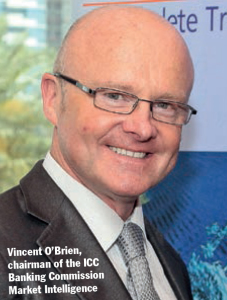Vincent O’Brien, chairman of the ICC Banking Commission Market Intelligence, talks exclusively to Cash&Trade about the results of this year’s survey.
What do this year’s survey results tell us about attitudes to risk in the present climate?
The survey registered an increase in demand for confirmation of letters of credit, which analysts attribute to the fact that international traders are increasingly risk-averse, or at the very least, increasingly risk-aware.
Paradoxically, while access to finance and risk coverage is still considerably underweight, the survey’s results shows that trade finance pricing is lower than in previous years, or remains unchanged – suggesting that the risk climate is not declining significantly.
Certainly, trade is growing, however at a rate well below the rates recorded prior to the recession.
Banks and industry operators remain cautiously optimistic, but the greater involvement of emerging markets in international trade – although essential to global economic recovery and development – has certainly contributed to an amplified perception of risk in the global trade finance market. Recent escalation of conflicts around the globe will also have a negative impact.
What are the main trends that you detect in the use of particular trade finance techniques/products?
The general decline in traditional paper-based trade finance products is continuing. This is due, in part, to the increasing use of electronic mediums in business activity.
Industry operators are seeking out and implementing more efficient alternatives to the traditional and largely paper-based commercial letter of credit, which is widely perceived as antiquated, time consuming and cost inefficient.
However, the decline in use of traditional trade finance products has not been dramatic, but rather consistent with the general deceleration of trade growth in recent years. Commercial letters of credit, in the context of risk coverage and financing and as a trade finance instrument, still play a dominant role on a transactional basis, followed with a wide margin by guarantees and standbys.
Unlike the trending for commercial letters of credit, however, there has actually been an increase in demand for guarantees as a means to cover potential risk of default or non-performance under commercial contracts.
The market remains decidedly favourable for buyers, and data show that there has been a general shift towards open account trading, which is a clear reflection of increased buyer or importer negotiation power.
When we move out of the traditional trade products, we can see that cross- border factoring is continuing to grow at an accelerated pace.
Can you tell us about any particular trends that you identify in the Middle East region?
The political turmoil affecting the Middle East region at present makes for a fragile international trade environment. Political unrest has impeded growth in trade, naturally affecting the region’s economic performance.
Having said this, the Middle East does still account for a significant proportion of global trade traffic, registering seven per cent on imports and five per cent on exports.
Banks are anticipating an increased Middle Eastern presence in international trade, and are adapting their businesses accordingly. Data suggest that the region is coming to a tipping point for rapid trade growth and development.
However, it goes without saying that the conflicts in the region are making that positive tipping point more difficult to reach. Stakeholders now understand that unhindered trade is mission-critical to advancing economic development – and, as history has taught us, economic development with the rewards evenly spread across the population is a pre-requisite for peace and stability.
 Cash And Trade Magazine For Cash and Trade professionals in the Middle East
Cash And Trade Magazine For Cash and Trade professionals in the Middle East





